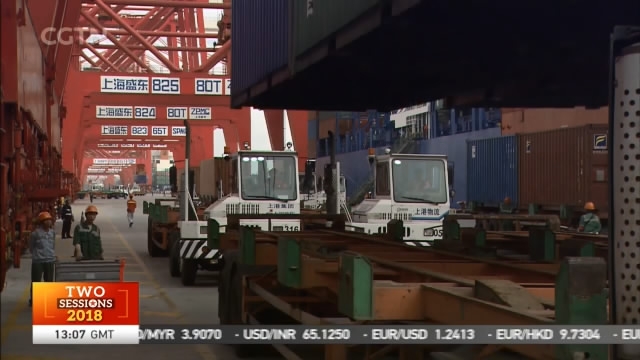
21:52, 08-Mar-2018
China-US Trade: What do tensions mean for China's foreign policies?

We are also watching for signals from the Foreign Ministry concerning China's stance on trade tensions with the US and cross-border business opportunities. Xia Cheng has the details.
Foreign Minister Wang Yi said Thursday that China would make a necessary response in the event of a trade war with the United States.
But he warned that such an effort would only harm both sides.
WANG YI CHINESE FOREIGN MINISTER "Despite elements of competition, China-US ties are defined more by partnership, not rivalry. Trade war is not the right solution. In a globalized world, it harms the initiator as well as the target country. Dialogue and cooperation are right things to do. China will make the necessary response in the event of a trade war with the United States."
Wang said on the sidelines of the Two Sessions that China has no intention of displacing the US.
China's exports unexpectedly surged at their fastest pace in three years in February.
That suggests that economic growth remains resilient even as trade relations with the US worsen.
Still, trade is considered a top risk for economists looking at China.
US President Donald Trump is expected to sign a proclamation on Thursday or Friday to make his steel and aluminum tariffs official. The duties are intended to counter cheap imports, especially from China.
Economists see little immediate impact on China's trade performances or its Financial-Industry opening-up policy because of the tariffs. But they fear that more measures against China may come. China, meanwhile, has other major trade and investment projects on the table such as its improving ties with the ASEAN countries, and the belt and road investment initiative.
Foreign Minister Wang Yi downplayed criticism of the transparency and political impact of China's belt and road initiative.
WANG YI CHINESE FOREIGN MINISTER "The belt and road initiative is a transparent initiative from China. It follows the 'golden rule' of extensive consultation, joint contributions and shared benefits. Everything is in the open. No country is dominating the process. Every party has an equal say. There are no back-room deals. The BRI is a global public good that follows international rules.
Meanwhile, the minister said that both the CPTPP -- the 11-country trade deal that doesn't involve China and the US -- and the China-led RCEP are positive as long as they promote the economic integration of the Asia Pacific and follow WTO rules.
Analysts believe going forward that China's opening-up policy will continue -- not because it pleases the international community, but because it serves China's own interests. However, they say that China makes sure that investor confidence won't be shaken by domestic policy swings or uncertain trade relations with the US.
What's up next for foreign investors? The foreign ministry said China would actively promote its Xiong An economic zone worldwide in 2018. XIA CHENG, CGTN.

SITEMAP
Copyright © 2018 CGTN. Beijing ICP prepared NO.16065310-3
Copyright © 2018 CGTN. Beijing ICP prepared NO.16065310-3